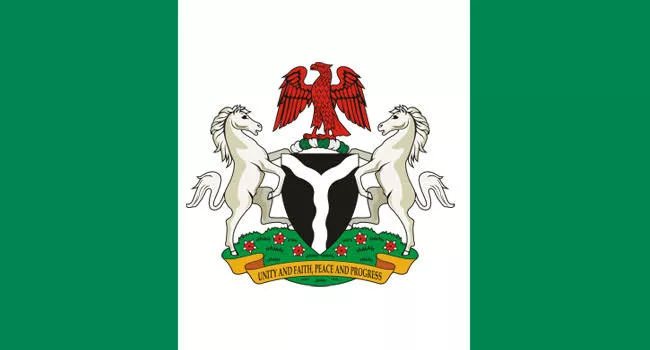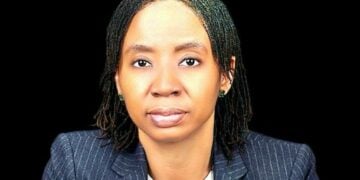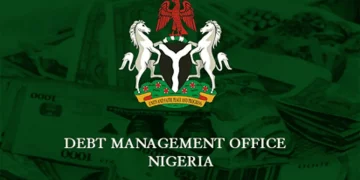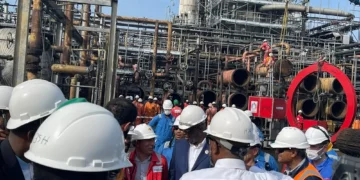As part of expectations for 2024, stakeholders have asked the federal and state governments to consolidate on their respective economic reforms as well as increased oil production emanating from the expected operation of Dangote and Portharcourt Refineries, among others, to shape the nation’s economy in the current year, LEADERSHIP learnt.
On its part, the Lagos Chamber of Commerce & Industry (LCCI), stated that, “our overall theme for the economy in 2024 is predicated on a consolidation of the reforms implemented by the new administration as we anticipate, albeit cautiously, follow-through policies that should enhance the already executed reforms.”
The director-general of LCCI, Dr. Chinyere Almona said, the federal government needs to sustain its targeted interventions in selected critical sectors like agriculture, manufacturing, export infrastructure and tackling insecurity.
She added that, “it is very imperative that we need sound monitoring and evaluation over the budget allocations to capital projects and defence spending to respectively tackle infrastructural deficit and the fight against insurgency.
“We urge the government to tackle oil theft to earn more foreign exchange and borrow from cheaper sources to reduce the burden of debt servicing. The government must block revenue leakages, reduce costs, and empower the private sector to create jobs and generate more revenue to the government.”
Similarly, the president of Manufacturers Association of Nigeria (MAN), Otunba Francis Meshioye said: “currently, the cost of manufacturing is daily rising owing to scarce and unavailable manufacturing inputs that continue to shrink profitability and threaten the existence of the critical sector of the economy. More worrisome is the fact that the sector that should propel job creation, productivity, and economic growth is enmeshed with series of challenges that constantly limit its contribution to the Gross Domestic Product.”
He explained that such challenges as epileptic power supply, insecurity, inadequate infrastructure, shortage of forex and naira depreciation are prevailing issues that are impacting negatively on the sector, saying,“if Nigeria manufacturers will compete effectively, then a comprehensive and concerted effort needs to be deployed in 2024 by the government to overtake the binding constrain that limit local production and then seek to attract foreign investment that will bring about a reduction in the forex chase and ensure sufficient forex inflow that the country clearly requires.“With a new administration steering the seat of governance, it is pertinent that all hands must be on deck to achieve a vibrant economy that can compete favourably. To start with, the government needs to prioritise investment in infrastructure and power, combat insecurity and corruption as well as introduce incentive policies that would make domestic production more attractive as against the importation of finished products.”
In the energy sector, the federal government, last year, through the Nigerian Upstream Petroleum Regulatory Commission (NUPRC), wrapped up a series of strategic engagements with 15 leading international and independent Oil and Gas Companies operating in Nigeria, a development market observers expect to increase oil production in the current year(2024).
The deal was sealed after a detailed review process by NUPRC and Chevron, Total, Shell, NAOC, Exxon Mobil, Seplat, Heirs Holdings, Waltersmith, First E&P, among others. A key objective of the discussions was to advance a Presidential Initiative aimed at addressing the nation’s revenue emergency whilst contributing to stabilizing Nigeria’s economy.
According to results of these talks, significant investment opportunities with an estimated $55.2 billion in investments projected by 2030, of which $13.5 billion is expected to be invested by these companies within 12 months.
Collectively, the participating oil firms pinpointed key strategies that will ensure the delivery of 2.1 million barrels by December 2024, positioning Nigeria well ahead of President Tinubu’s campaign promise of the 2.6 million barrels by 2027. And with the expected coming upstream of the Dangote and Portharcourt Refineries , there is hope for increased oil production as well as local oil refining that may beginning to address the impact of subsidy removal on the people, in the current year,
The proposed measures are also expected to cause a 100 per cent increase in gas production by 2027, exceeding President Bola Tinubu’s campaign pledge of 20 per cent growth in that sector.
Meanwhile, capital market analysts noted that, having started 2023 at a snail’s pace, Nigerian equities ascended to a 15-year high, as new economic heralders came bearing gifts in the form of market-friendly reforms, which reinvigorated investors’ confidence in local stocks.
Analysts at Cordros Securities said: “we expect Nigerian equities to exhibit resilience in 2024, though at a modest pace. Our projection is that we do not expect any of our identified determining factors, an improvement in the FX space, prospects of improved macroeconomic conditions, and monetary policy direction and impact on fixed income yields to have an outsized impact on eventual market performance.
“Nonetheless, we highlight the risk of a disconnect between improvement in company fundamentals and valuation multiples and intermittent profit-taking by investors. All in, we forecast a 11.6 per cent positive return.”
The chief executive officer of Crane Securities Limited, Mike Ezeh said, the emergence of President Bola Tinubu further energised the market since market participants have hope in his ability to rejig the economy and implement economy friendly policies.
“The elections came and was hitch free against all unification of the multiple exchange rates, review of monetary and fiscal policies, shake up major changes carried out at the apex bank and its overflow down to the deposit money banks across the country brought stability to the market.
“The commissioning of the first indigenous private refinery which has cyclical effect on both upstream and downstream operations of petroleum companies quoted in the market propelled the interplay in the market by some high-net-worth investors on many quoted companies resulting in high turnover in trading volumes of those companies leading to the significant increase in market capitalisation within the period,” he said.
In the same vein, analysts at Cowry Assets Management Limited said: “the upcoming week marks the commencement of the new trading month and the year 2024 with investors anticipating positive policy reforms from economic drivers.”
Cowry Research anticipated “a pervasive bullish sentiment as investors position themselves for the new year through sectoral portfolio rebalancing. With the January effect in play, investors are expected to engage in profit-taking and bargain hunting for dividend-paying stocks as the reporting and earnings season approaches.
“The strategic reallocation of funds among sectors and adjustments in portfolios to align with changing market conditions are likely to shape trading activities, reflecting investors’ pursuit of optimal risk-return profiles and capitalizing on emerging opportunities.
“Amidst all these, we maintain our advice to investors on taking positions in stocks with sound fundamentals and whose earnings yield and earnings per share support higher payout ratio.”
Moreover, the insurance stakeholders expect life insurance to drive premium income in 2024 just as it has done in the outgone year, as more Nigerians begin to pick interest in life insurance policy.
The commissioner for Insurance/CEO, the National Insurance Commission(NAICOM), Mr. Sunday Olorundare Thomas, expect government to increase its subscription to insurance of assets and lives in the current year as awareness increases in government corners, stating that, annuity product will equally witness more subscribers from the retiring workers in the country.
More Nigerians are equally expected to procure life insurance to the tune of N500billion premium in the new year, amidst tough social and business lives that are currently shortening life span or leading to ailments in people, LEADERSHIP learnt.
A report released by the National Insurance Commission (NAICOM) had revealed that, as at the 3rd quarter of 2023, Nigerians had spent N265.39 billion on life insurance with projection of over N350billion by the time the 4th quarter report of insurance industry comes out.
With increasing awareness on life insurance as a wealth security scheme for families, there are even higher expectations that more Nigerians will insure their lives, thereby, leading to increased premium that market observers expect to hit N500billion in the current year(2024).
Life insurance is a contract between a policyholder and an insurance company. In exchange for premium payments, the life insurance company will pay a lump sum known as a death benefit to beneficiaries after the policyholder’s death, as long as the policy is in force.
If you have permanent life insurance, there may be a cash value component, too. Similarly, this policy also allows you to take money from your own death benefit while you are still living, but only in specific cases, such as: if you are diagnosed with a terminal illness or develop a chronic or critical illness.
The subscription rate of life insurance in Nigeria surges post Covid-19 as the pandemic exemplified the importance of having a life insurance coverage as victims of the pandemic were able to leverage life coverage to cater for the families of those who lost their lives to this disaster while those who survived it were equally able to use it to treat themselves in respective hospitals.
NAICOM in a document entitled: ‘Nigerian Insurance Market at a Glance – Q3, 2023’, revealed that, individual life insurance class was the major driver of the insurance industry, contributing N265.39 billion, which is 36.4 per cent of the recorded N729.1 billion gross premium written as at the 3rd quarter of 2023. If the figure of group life, which is also a form of life insurance coverage, is added to the individual policy, the cumulative premium for life coverage exceeded N300billion as at Q3, 2023.
Speaking at the Heirs Insurance Group Year-End Media Parley at the company’s head officer in Victoria Island, Lagos recently, the managing director/chief executive officer, Heirs Insurance Limited, Niyi Onifade, confirmed the recent surge in uptake of individual life insurance policies, stating that, his company generated the highest from life insurance business in the outgone year.
He attributed the surge to increased education and awareness amongst others, believing the situation will even be better in the new year owing to challenging economy that will force more people to see insurance as a succour and risk mitigation mechanism going forward.
In the meantime, the Nigeria Labour Congress (NLC) has described 2023 as very trying period for Nigerian workers and that year 2024 should be year of restoration of peace and progress for all Nigerians.
NLC president, Comrade Joe Ajaero lamented that, 2023 was though, expressing
displeasure at the hardship Nigerians went through, expecting the Federal Government to do better in the current year, calling on President Bola Tinubu to give life a meaning for everyone in 2024.
Reacting to how labour has scored the President Bola Tinubu’s industrial plans, an anonymous Labour leader said: “We gave him 15 Points Agenda to work on for peace to reign and we are monitoring to see if any of those points are being met. Among that list is revival of refineries beginning with that of Port Harcourt refinery. But we all saw how they tried to deceive not only labour but the whole Nigerians making us to believe in lie by pumping gas into it and announced that Port Harcourt refinery is ready. Government should not take us for granted in year 2024. We hope BAT will follow his promised peaceful dialogue with organized labour for industrial harmony in 2024.”
In the meantime, the Organised labour is expected to hold the federal government by the jugular to ensure upward review of National Minimum Wage in Year 2024 following the expiration of the last review.
Although, the next review ought to take place in April 2024, but with high inflation inducing high cost of living, thereby, making the current wages worthless, labour is eagerly expecting the review to take place.
Speaking with LEADERSHIP, a top official in the Nigerian Labour Congress(NLC), who preferred to be anonymous said: “It is constitutional structure that must follow due process. We expected President Bola Ahmed Tinubu to inaugurate National Minimum Wage review Committee by now but we are still hopeful, since that committee is meant to do its work and submit its report before April.”
Similarly, Nigerians are optimistic and expectant that year 2024 will be better and greater than the one they left behind.
On his part, Mr Bosun Oluwatubosun, a Pastor in MFM Church, Ogun State said, President Bola Ahmed Tinubu should improve the living conditions of Nigerians through impactful policies in 2024.
In the same vein, Idowu Oguntuyo, an Abeokuta-based businessman, said: “What I expect from President Bola Ahmed Tinubu’s administration in 2024 is to make life easier for Nigerians through provision of affordable transportation, food stuff and tackling of insecurity. The rampages of bandits or Fulani herdsmen especially in Plateau State should be made to stop in 2024.”
Similarly, John Odey, who lives in Ikeja, Lagos, said: “The country is hard for the youths, and it’s so bad that except you have a connection somewhere, you cannot make it. My expectations for the country in 2024 is that living condition should be easier than it was in 2023. So, my expectations from government is to fix the dilapidated infrastructure and provide the necessary amenities that will make life easier for the people and businesses.”
A retiree, Emmanuel Ente, expects a visible economic improvement in 2024, a drop in the price of food items, the rehabilitation and coming upstream of some oil refineries to boost oil production, believing that, things might begin to look better in the first quarter of the new year..
A civil servant, Francis Bassey, said: “Well, let’s just see if everything will be okay next(this)year, but I doubt the economy will improve. If you see, there are no changes in policy; all the ministers are still there. So I do not think there will be a visible improvement in the economy.”
Another Lagosian, Aremu Olanrewaju, said: “My expectation for the new year is long life, good health and improvement in my finances because it is a difficult time being a Nigerian. The cost of items such as food, school fees, house rent and transportation is alarming. I pray there will be a stable economy for small businesses because 2023 was a tough year, I must confess”
For 67 Year Old pensioner, who wants to be identified as Mama Daniela, “I think it is high time the government should feel the pulse of the average Nigerians and act right.
“In as much as individuals, we pray for good fortunes, long life and want the best for ourselves. As a nation, our leaders need to know the hardship the people are going through and the mismanagement of the nation’s resources by government should not be part of what government should encourage. Nigeria will prosper if the government and the citizen takes responsibilities for their action.”
Ahmadu Basheer, a vulcanizer said he hope for a better 2024 for Nigerians.
He stated that, “this new year will be a prosperous one for us. All I want is that government should help the masses, because the tough times people are facing is serious. Government should embark on more impactful programmes for people.”





